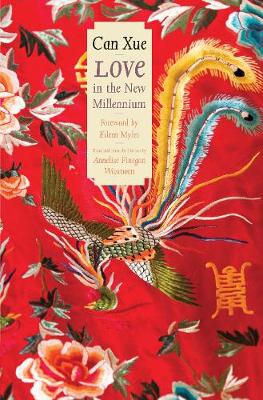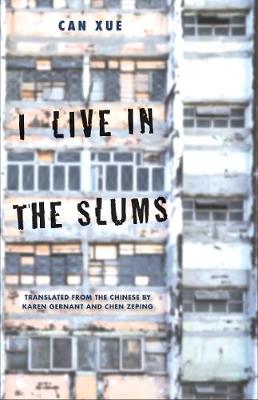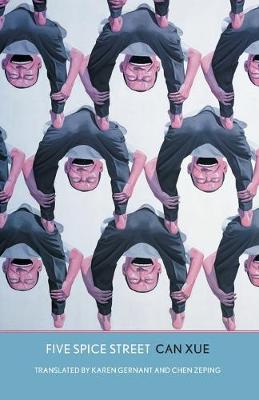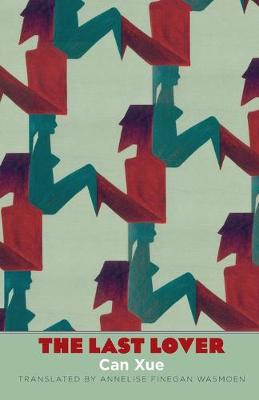World Republic of Letters (Yale)
4 total works
Longlisted for the Man Booker International Prize 2019
The most ambitious work of fiction by one of the world’s greatest writers
“In this dreamlike novel . . . amid increasingly bizarre scenarios, appearances give way to hidden, otherworldly layers.”—New Yorker
In this darkly comic novel, a group of women inhabits a world of constant surveillance, where informants lurk in the flower beds and conspiracies abound. Some try to flee—whether to a mysterious gambling bordello, underground ancestral homes, or Nest County, where traditional medicines can reshape or psychologically transport the self.
Can Xue’s mesmerizing storytelling traces love’s many guises—satirical, tragic, transient, lasting, nebulous, and fulfilling—against a kaleidoscopic backdrop of commerce and industry, fraud and exploitation, and sex and romance drawn from the East and the West.
The most ambitious work of fiction by one of the world’s greatest writers
“In this dreamlike novel . . . amid increasingly bizarre scenarios, appearances give way to hidden, otherworldly layers.”—New Yorker
In this darkly comic novel, a group of women inhabits a world of constant surveillance, where informants lurk in the flower beds and conspiracies abound. Some try to flee—whether to a mysterious gambling bordello, underground ancestral homes, or Nest County, where traditional medicines can reshape or psychologically transport the self.
Can Xue’s mesmerizing storytelling traces love’s many guises—satirical, tragic, transient, lasting, nebulous, and fulfilling—against a kaleidoscopic backdrop of commerce and industry, fraud and exploitation, and sex and romance drawn from the East and the West.
Longlisted for the 2021 International Booker Prize
A major new collection of stories by one of the most exciting and creative voices in contemporary Chinese literature
“There’s something inescapably cosmic about [Can Xue’s] writing: the grandness of her vision, the abstraction of her thought, the way the details of lived reality seem to shrink and assume an equal significance, as though one were orbiting a distant star and peering down.”—Bailey Trela, Los Angeles Review of Books
Can Xue’s stories observe no obvious conventions of plot or characterization. That is the only rule they follow. Instead, they tend to limn a disordered and poetic state given structure by philosophical wonder and emotional rigor.
Combining elements of both Chinese materiality—the love of physical things—and Western abstract thinking, Can Xue invites her readers into an immersive landscape that blends empirical fact and illusion, mixes the physical and spiritual, and probes the space between consciousness and oblivion. She brings us to a place that is both readily familiar yet unmappable and can make us hyperaware of the inherent unreliability in our relationship to the world around us. Delightful, enchanting, and filled with secrets, Can Xue’s newest collection shines a light on the forces that give contours to the visible terrain we acknowledge as reality.
A major new collection of stories by one of the most exciting and creative voices in contemporary Chinese literature
“There’s something inescapably cosmic about [Can Xue’s] writing: the grandness of her vision, the abstraction of her thought, the way the details of lived reality seem to shrink and assume an equal significance, as though one were orbiting a distant star and peering down.”—Bailey Trela, Los Angeles Review of Books
Can Xue’s stories observe no obvious conventions of plot or characterization. That is the only rule they follow. Instead, they tend to limn a disordered and poetic state given structure by philosophical wonder and emotional rigor.
Combining elements of both Chinese materiality—the love of physical things—and Western abstract thinking, Can Xue invites her readers into an immersive landscape that blends empirical fact and illusion, mixes the physical and spiritual, and probes the space between consciousness and oblivion. She brings us to a place that is both readily familiar yet unmappable and can make us hyperaware of the inherent unreliability in our relationship to the world around us. Delightful, enchanting, and filled with secrets, Can Xue’s newest collection shines a light on the forces that give contours to the visible terrain we acknowledge as reality.
The first full-length novel by Chinese author Can Xue to appear in English
“There’s no other writer in China like Can Xue . . . strange, surreal, and very compelling . . . [and] this novel is probably the best place to start.”—Chad Post, Publishers Weekly
Five Spice Street tells the story of a street in an unnamed city whose inhabitants speculate on the life of a mysterious Madam X. The novel interweaves their endless suppositions into a work that is at once political parable and surreal fantasia. Some think X is 50 years old, others that she is 22. Some believe she has occult powers and has thereby enslaved the young men of the street; others think she is a clever trickster playing mind games with the common people. Who is Madam X? How has she brought the good people of Five Spice Street to their knees either in worship or in exasperation? The unknown narrator takes no sides in the endless interplay of visions, arguments, and opinions. The investigation rages, as the street becomes a Walpurgisnacht of speculations, fantasies, and prejudices. Madam X is a vehicle whereby the people bare their souls, through whom they reveal themselves even as they try to penetrate the mystery of her extraordinary powers.
Exploring the collective consciousness of this little street of ordinary people, Can Xue penetrates the deepest existential anxieties of the present day—whether in China or in the West—where the inevitable impermanence of identity struggles with the narrative within which identity must compose itself.
“There’s no other writer in China like Can Xue . . . strange, surreal, and very compelling . . . [and] this novel is probably the best place to start.”—Chad Post, Publishers Weekly
Five Spice Street tells the story of a street in an unnamed city whose inhabitants speculate on the life of a mysterious Madam X. The novel interweaves their endless suppositions into a work that is at once political parable and surreal fantasia. Some think X is 50 years old, others that she is 22. Some believe she has occult powers and has thereby enslaved the young men of the street; others think she is a clever trickster playing mind games with the common people. Who is Madam X? How has she brought the good people of Five Spice Street to their knees either in worship or in exasperation? The unknown narrator takes no sides in the endless interplay of visions, arguments, and opinions. The investigation rages, as the street becomes a Walpurgisnacht of speculations, fantasies, and prejudices. Madam X is a vehicle whereby the people bare their souls, through whom they reveal themselves even as they try to penetrate the mystery of her extraordinary powers.
Exploring the collective consciousness of this little street of ordinary people, Can Xue penetrates the deepest existential anxieties of the present day—whether in China or in the West—where the inevitable impermanence of identity struggles with the narrative within which identity must compose itself.
From the sensational Chinese author who has been called “a new world master,” a Kafkaesque novel set in a fictional Western nation
Winner of the 2015 Best Translated Book Award for fiction, presented by Three Percent, a resource for international literature
“[A] mind-bending novel. . . . Xue succeeds in creating a unique, immersive, tale of ‘intersecting dreamworlds.’”—Publishers Weekly
In Can Xue’s extraordinary book, we encounter a full assemblage of husbands, wives, and lovers. Entwined in complicated, often tortuous relationships, these characters step into each other’s fantasies, carrying on conversations that are “forever guessing games.” Their journeys reveal the deepest realms of human desire, figured in Can Xue’s vision of snakes and wasps, crows, cats, mice, earthquakes, and landslides. In dive bars and twisted city streets, on deserts and snowcapped mountains, the author creates an extreme world where every character “is driving death away with a singular performance.”
Who is the last lover? The novel is bursting with vividly drawn characters. Among them are Joe, sales manager of a clothing company in an unnamed Western country, and his wife, Maria, who conducts mystical experiments with the household’s cats and rosebushes. Joe’s customer Reagan is having an affair with Ida, a worker at his rubber plantation, while clothing-store owner Vincent runs away from his wife in pursuit of a woman in black who disappears over and over again. By the novel’s end, we have accompanied these characters on a long march, a naive, helpless, and forsaken search for love, because there are just some things that can’t be stopped—or helped.
Winner of the 2015 Best Translated Book Award for fiction, presented by Three Percent, a resource for international literature
“[A] mind-bending novel. . . . Xue succeeds in creating a unique, immersive, tale of ‘intersecting dreamworlds.’”—Publishers Weekly
In Can Xue’s extraordinary book, we encounter a full assemblage of husbands, wives, and lovers. Entwined in complicated, often tortuous relationships, these characters step into each other’s fantasies, carrying on conversations that are “forever guessing games.” Their journeys reveal the deepest realms of human desire, figured in Can Xue’s vision of snakes and wasps, crows, cats, mice, earthquakes, and landslides. In dive bars and twisted city streets, on deserts and snowcapped mountains, the author creates an extreme world where every character “is driving death away with a singular performance.”
Who is the last lover? The novel is bursting with vividly drawn characters. Among them are Joe, sales manager of a clothing company in an unnamed Western country, and his wife, Maria, who conducts mystical experiments with the household’s cats and rosebushes. Joe’s customer Reagan is having an affair with Ida, a worker at his rubber plantation, while clothing-store owner Vincent runs away from his wife in pursuit of a woman in black who disappears over and over again. By the novel’s end, we have accompanied these characters on a long march, a naive, helpless, and forsaken search for love, because there are just some things that can’t be stopped—or helped.



